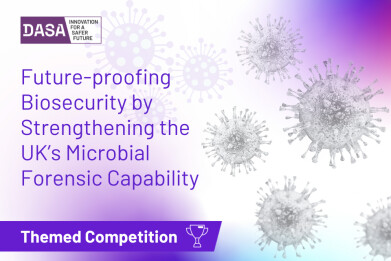-
 A primary goal of the competition is to engage with ‘non-traditional’ organisations, in addition to the MoD’s existing supplier pool, to seek and yield innovative solutions
A primary goal of the competition is to engage with ‘non-traditional’ organisations, in addition to the MoD’s existing supplier pool, to seek and yield innovative solutions
News
Enhancing UK biosecurity: Ministry of Defence launches £1 million competition to augment microbial forensics capability
Dec 18 2024
Defence procurement bodies, DASA and UKMFC, are seeking competition entries with novel technologies in genomic sequencing, identification and analysis
The UK’s Defence and Security Accelerator (DASA), an agency of the Ministry of Defence (MoD), has launched a £1 million competition to tackle challenges in the field of microbial forensics. Specifically, this branch of forensics aims to determine whether an incident involving a biological hazard is natural or nefarious in origin and provide for the provenance of the tested material as well as the identification of the biological organism.
The competition is being run in collaboration with the Defence Science and Technology Laboratory (DSTL), which is leading on the creation of the United Kingdom Microbial Forensics Consortium (UKMFC), in order to provide frontline biosurveillance laboratories which will strengthen the UK’s microbial forensic capabilities.
DSTL provides expert scientific advice and deployable capabilities to resolve the most challenging national security incidents; those involving explosive, chemical or biological materials. DSTL hosts the UK’s only sovereign Chem-Bio capability used to analyse and understand the world’s most deadly pathogens and biological weapons.
The UKMFC is being developed in support of the ‘Detect Pillar’ of the UK’s Biological Security Strategy, establishing a network of biosurveillance laboratories across all four nations of the UK, and operating under the One Health doctrine, defined by the World Health Organization as: “an integrated, unifying approach that aims to sustainably balance and optimize the health of people, animals and ecosystems”.
The competition seeks novel technology options, or technical approaches, which can directly support this initiative. A primary goal of the competition is to engage with ‘non-traditional’ organisations, in addition to the MoD’s existing supplier pool, to seek and yield innovative solutions.
The total prize available in the competition is £1 million with the MoD looking to fund a minimum of four projects each up to a maximum value of £250,000.
Winners will be drawn from those entrants that can move a range of technology options from a low to a medium technology readiness level (TRL).
Research areas are of particular interest include:
- Computational tools that improve the opportunity to detect anomalies in genome sequencing data, including evidence of biological engineering.
- Technologies that allow the identification and / or computational analysis of other omic (transcriptomics and proteomics) signatures for novel microbial forensic capabilities.
The competition document includes in its criteria this condition:
“Any new capability should not increase the risks encountered in the day-to-day activities of a laboratory, or significantly increase the financial burden encountered by a laboratory (above normal investment patterns). There is no interest in technology development that would provide a solely mobile microbial forensic capability or enhance a laboratory’s ability to simply identify a pathogen.”
Full details can be read in the competition document. The deadline for submissions is 12:00 midday (GMT) on 18 February 2025.
Supporting events
- Thursday 9 January 2025
A dial-in online seminar providing further details on the problem space and a chance to ask questions of the competition team in an open forum. If you would like to participate, please register through Eventbrite. - Wednesday 15 and Tuesday 21 January 2025
One-to-one teleconference sessions will be made available on both 15 and 21 January to allow for asking specific questions of the competition team in a closed forum. Registration details for these supplementary sessions will be published by DASA on 10 January 2025. Booking will be on a first come first served basis.
Further reading
Digital Edition
Lab Asia Dec 2025
December 2025
Chromatography Articles- Cutting-edge sample preparation tools help laboratories to stay ahead of the curveMass Spectrometry & Spectroscopy Articles- Unlocking the complexity of metabolomics: Pushi...
View all digital editions
Events
Jan 21 2026 Tokyo, Japan
Jan 28 2026 Tokyo, Japan
Jan 29 2026 New Delhi, India
Feb 07 2026 Boston, MA, USA
Asia Pharma Expo/Asia Lab Expo
Feb 12 2026 Dhaka, Bangladesh


















